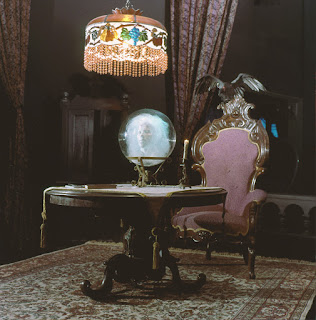I complained about Kate Summerscale's previous book ("The Suspicions of Mr. Whicher") but at the end read it twice and even bought one copy as a gift. She has a meandering way with storytelling but her subjects are fascinating so I will continue to go on with her work, even though sometimes I wish she go on with the story instead of trying to explain the social contest and background of each character mentioned along the way.
"The Haunting of Alma Fielding" is another true-life story that happened in the twilight of 1930s, just as WW2 was becoming a serious threat. Some kind of panic and fear is already in the air, no wonder that so many people were intrigued with spiritualism, seances and ghosts. It might as well be reaction on uneasiness and atmosphere filled with danger. Hungarian emigrant Nandor Fodor works at the International Institute for Psychical Research but so far he had not find any genuine medium - he was successful at unmasking the fraudsters but he came to the point where his job is at the risk and needs to find a proper person, someone who is truly a miracle worker.
And voilà - here comes suburban housewife Alma Fielding, around whom furniture moves by itself, dishes crash all over the place and even radio smashes on the floor by itself. Even more bizarre, Fielding produces various objects from her sleeves, like jewellery, gloves, etc. And she claims to have no idea how did they get there. Fodor is excited but naturally cautious so when he invites her over to Research center (where she is paid for each visit), he has the whole army of witnesses and helpers who can testify that Fielding is real deal. In the separate toom, Fielding is strip-searched and checked before she falls into trance and speaks possessed by a ghost named Bremba. Other people in the group started smelling unpleasant odours during seances and they generally felt alarmed and uneasy in her presence. As the experiments progressed, Fodor notices that Fielding often seems strangely detached from herself during seances, almost like she is not present and he started to wonder is this perhaps not about a ghost but about mental disturbance.
This is where experiments get more brutal - the more Fodor is suspicious, the more it gets obvious that Fielding does everything to continue being the centre of attention, including perhaps cheating (there are strong hints that she was fraudster) but we can still not explain weird phenomena around her. Just when Fodor started to suspect this is all a reflection of her suppressed memory and she might have created Poltergeist out of long-buried traumas, the colleagues in the Institute demand closure of the experiment - they don't like the direction this research is taking and its all abruptly stopped and swept under the rug. Later we find out that no other but Dr. Freud approved of Fodor's experiments and found the theory completely reasonable and possible.


No comments:
Post a Comment